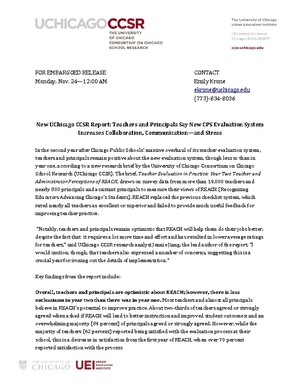1. What are teacher and principal perceptions of (Recognizing Educators Advancing Chicago’s Students) REACH?
As part of the UChicago Consortium's ongoing study of Chicago Public Schools (CPS) new teacher evaluation system, this report looks at teacher and principal perceptions in the second year of implementation. It finds teachers and principals remain positive about the new evaluation system, though less so than in Year 1.
This brief, a continuation of the work that began in Teacher Evaluation in Practice: Implementing Chicago’s REACH Students, draws on survey data from more than 19,000 teachers and nearly 800 principals and assistant principals to measure their views of REACH (Recognizing Educators Advancing Chicago’s Students). REACH replaced the previous checklist system, which rated nearly all teachers as excellent or superior and failed to provide much useful feedback for improving teacher practice.
This project is a joint study of REACH by the UChicago Consortium in collaboration with CPS and the Chicago Teachers Union.
Key findings from the report include:
- Overall, teachers and principals are optimistic about REACH; however, there is less enthusiasm in year two than there was in year one.Most teachers and almost all principals believe in REACH’s potential to improve practice. About two-thirds of teachers agreed or strongly agreed when asked if REACH will lead to better instruction and improved student outcomes; and an overwhelming majority (89 percent) of principals agreed or strongly agreed. However, while the majority of teachers (62 percent) reported being satisfied with the evaluation process at their school, this is a decrease in satisfaction from the first year of REACH, when over 70 percent reported satisfaction with the process.
- Teachers and principals report REACH is changing practice, improving communication, and encouraging collaboration.Eighty-six percent of teachers agreed or strongly agreed that the observation process has changed their teaching. Principals also noted changes in teachers’ practice. Over 80 percent said their teachers had changed their instruction to do better on REACH, and almost all reported at least half of their teachers had made noticeable improvements in their classrooms.
- Most teachers believe their evaluation relies too heavily on student growth and raised questions about the fairness of the assessments.In 2012-13 and 2013-14, student growth accounted for up to 25 percent of a teacher’s REACH rating. When asked if their evaluation relies too heavily on student growth, 65 percent of teachers agreed or strongly agreed. Moreover, only half of teachers said the assessments used to measure student growth are fair assessments of their students’ learning.
- Beginning teachers are more positive about REACH than teachers with more years of experience.Teachers with five or fewer years of experience in the district are more positive about REACH than those with more years of experience: 71 percent of beginning teachers said they were satisfied with the system, compared with 58 percent of veteran teachers.
- Teachers and principals report increased levels of teacher stress and questioned the effort required by REACH.The large majority of teachers (79 percent) reported that the evaluation process had increased their levels of stress and anxiety. A similar proportion of principals agreed teachers felt more stress as a result of the new system. In addition, both teachers and evaluators questioned the effort required by the process, with almost 60 percent of teachers and 45 percent of evaluators agreeing that the evaluation process takes more effort than the results are worth.



